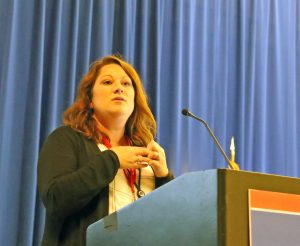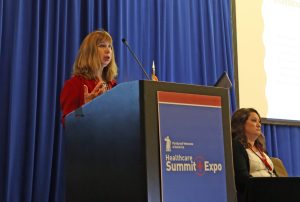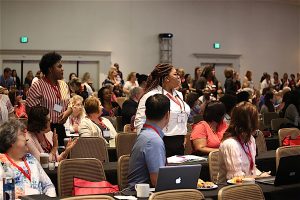A diverse array of seminars awaits those attending the 2019 PVA Healthcare Summit +Expo
Paralyzed Veterans of America’s (PVA) leaders loved the diversity of the organization’s 2019 Healthcare Summit +Expo in Orlando, Fla. But they also encouraged attendees to make sure they took time for themselves at Thursday’s opening day of the three-day event held inside the Renaissance Orlando at SeaWorld hotel.
There’s a diverse array of seminars to attend. With topics covering everything from the beginning of spinal-cord injury from a neurosurgical standpoint to community-based areas, the doctors, nurses, social workers and other health care professionals attending the event have plenty of ways to learn how to provide the best care possible to veterans and others with spinal-cord injury and disease.
“We put together a good program, but I think the most important thing about the summit is the opportunity to visit with one another and network and learn what other people are doing,” said Cheryl Vines, PVA’s director of research and education. “We hope that you’ll be able to take the information that you learn today back to your practice. I always think the best sessions are the ones that you can put the information back to work when you go to work on Monday.”
In his opening remarks, PVA National President David Zurfluh said the knowledge gained from this event over the years has had not just an impact on his own health, but also on the health of PVA members across the country and people with disabilities around the world.
“What you all learn here will not only strengthen your skill set but will have a huge impact on the patients you provide care for now and in the future,” Zurfluh said.
PVA Executive Director Carl Blake echoed Zurfluh’s sentiment, adding that the care veterans receive is sometimes taken for granted.
“You all save people’s lives every day in some capacity, and I think you do it and you don’t get recognized for it. You just do it,” Blake told the roomful of clinicians. “You come to work every day because you care about the mission of the VA [Department of Veterans Affairs]. You care about your purpose, you care about the veterans that you’re serving, and that’s a noble call. Not everyone is cut out for it, not everyone wants to be part of that, but we certainly appreciate the fact that you all here are willing to take on that endeavor and be a part of that, because you, frankly, do change the lives of veterans every day.”
PSYCHOSOCIAL CARE & ALS
Changing lives sometimes involves handling difficult tasks, such as helping a veteran navigate the psychosocial aspects of a diagnosis of amyotrophic lateral sclerosis (ALS). Two social workers – Sarah Bernas, LMSW, ACPH-SW, and Sheryl Fowler, LCSWR – from the Albany Stratton VA Medical Center in Albany, N.Y., discussed that topic during one of the morning breakout sessions, titled Packing Your Parachute: The Value of a Proactive Psychosocial Focus for Veteran Care with ALS.

“This disease can be a difficult one. She can come in hot and heavy or she can just be silent, kind of taking things away one at a time,” said Bernas. “But certainly from the moment you notice something’s different in your body to the moment you’ve been given the diagnosis, you begin the grief and loss process. You have grief about what you may not be able to do. You have loss of maybe relationships in your life because people are unable to deal with a difficult situation.”
Bernas said digging into the patient’s life, identifying the pieces of it that matter most to him or her and supporting the patient’s choices in an educated way are what make a difference in psychosocial care.
“What we’re looking at is you’re about to jump out of a plane, you know you’re going to fall. How you’re going to land is based on what’s packed in that special little bag on your back,” Bernas said. “So, it’s essential that you have everything you need: information, support, everything that’s in the community, everything in your home that you’ll need. So, as far as ALS goes, you know that this is going to be a jump, and there will definitely be a fall. So, what we’re going to do is give you the information and the skills to pack your veteran’s parachute so as this happens, we can cushion as we go.”
Fowler said the key for practitioners in providing psychosocial care is to be proactive, to anticipate disease changes and plan well in advance to meet the needs of veterans and their families, including looking at caregiver issues, finances, housing and the size of the medical team. Shared belief systems, the values the veteran brings into the situation, the health care team, the family dynamics and how support is obtained throughout the disease process are all part of psychosocial care, Fowler said.
“Many times, we’re going to meet with people who are talking about symptom management, but they’re not talking about how that symptom management or that intervention is going to play out in their family dynamics or their home,” Fowler said. “So, we can talk about things like feeding tubes without figuring out who’s going to take care of the feeding tube, or whether they live in a rural or urban community where services are going to be available for them. So when we make a decision about feeding tubes or breathing apparatus or other things, then we need to talk about what is the foundation? What is the parachute?”
Fowler said it’s also important for providers to find out the patient’s goals, understanding of the particular disease progression, his or her attitudes about life and death and cultural and spiritual beliefs.

“You know, for so many of our veterans who come in and are faced with this disease, no one has ever asked them, ‘How do you want to live?’” Fowler said. “A life-threatening disease puts us in a situation where we have to ask this because now they’re faced with a perhaps difficult, difficult outlook.”
Providers should also give information slowly and help the patient identify resources in a timely fashion, Fowler said.
“Some people want a lot of community resources. They want to go to ALS support groups. They want to go online and be part of the chat groups,” Fowler said. “Some people don’t want to do that at all. Some people get very overwhelmed when we give them too much resources. So, I’m going to warn you, don’t give too much resources in the beginning because people will read all these things and make assumptions about what’s going to happen to them instead of just managing today, present.”
And clinicians should be prepared to start a conversation about palliative care, which is focused on symptom management, advance directives, designating a health care proxy and making end-of-life decisions at the beginning of the diagnosis, Fowler said.
“Sometimes, patients are not going to be able to participate in the decision making as the disease goes on, so if we don’t bring it up at the beginning, a lot of times they’ll be more stressed out because of symptom issues, it’s going to be harder and harder to bring these things up as the disease progresses,” Fowler said.
In addition, Bernas suggests digging deep into patients’ biggest fears and concerns.
“Now, this is something that will change every time we meet, as their disease process changes, as their life changes, their biggest fear might be, ‘I won’t be able to walk my daughter down the aisle,’ or maybe, ‘I’m not going to be able to have sex with my wife,’” Bernas said. “It might be, ‘I’m not going to be able to eat pizza.’ So sometimes that’s the only thing you can offer in a sense of comfort for someone is to say, ‘OK, I hear you saying that’s a concern, but we’re not there yet, so what can we do to manage things so we can keep that for you as long as we can?’”
Overall, Bernas said providers must guide their patients through the process of “losing and living.”
“We talk about giving information, we talk about setting a framework, we talk about all these things, but one of the most important things we need to keep in focus is in life, there is hope. So we can hope for a cure or we can find what’s reasonable to be hopeful about,” Bernas said. “So we may be the bearers of bad news, we may have to be the reality checks, but we can also be the comforters. We can also the people who remind these folks that, yes, this has happened to you, and we are with you. What can we hope for next?”



